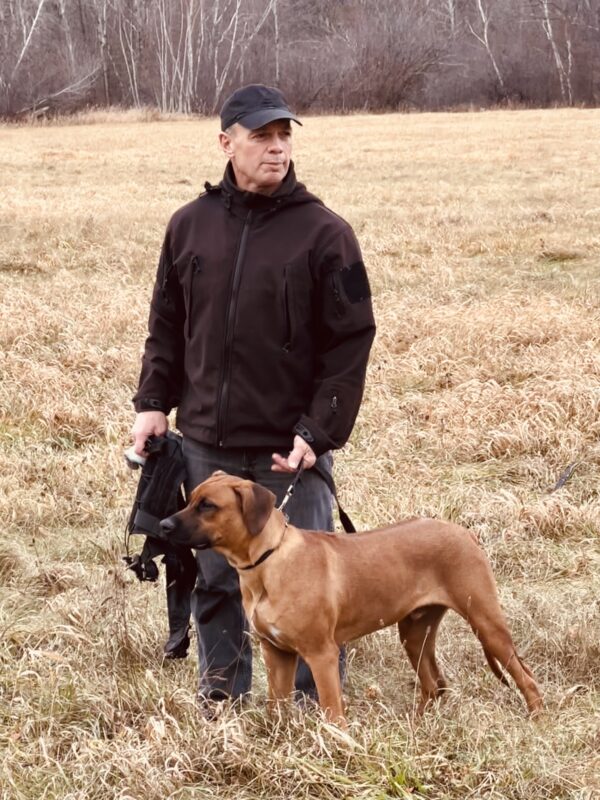For Amblo, fulfilling more important than wallet filling
(In an earlier version of this story online, Jessy Amblo’s first name was misspelled.)
Jessy Amblo is a man of many talents. He is the founder and president of Sports Science Association, a global fitness and nutrition consulting firm, as well as the founder and current shidoshi (defined as “teacher of the way”) at the Bujinkan Kongoshin Dojo, but his skill set includes falconry, training working dogs, body building and boxing.

Jessie Amblo has recently begun training dogs and has found success with his Rhodesian ridgeback, Reckless Ender.
Amblo has travelled the world, but as a young boy, he looked forward to trips to Burlington from his family’s home in Charlotte. On one of those trips, he purchased the book “Ninjutsu: History and Tradition” by Masaaki Hatsumi at an Asian gift shop. That was the beginning of a lifelong journey in the martial arts, which culminated in a trip to Japan to study under Hatsumi himself.
Amblo practices a Japanese martial art called kobudo, which is over 800 years old. By contrast, he said that modern karate is only 100 years old. In 1989, Amblo founded the Bujinkan Kongoshin Dojo.
“I’ve been at this for 30 years,” he said, “and it’s evolved into an understanding of how seeing both sides of the coin could help me be a better person.”
Kobudo is so old that one cannot master the knowledge in a single lifetime, Amblo said. He has attained the level of 15th degree black belt, the highest achievable level in martial arts.
In 2000, Amblo founded Sports Science Association, a global fitness and consulting firm. Initially he worked with professional athletes and other high-performing individuals.
He was invited to Argentina to work with a group that included several police officers. They were so impressed with his training that he was invited back for seven straight years.
Recently, Amblo has changed the focus of Sports Science Institute to helping older people focus on longevity and quality of life.
“I’m 55 but I still maintain a very high level of fitness,” he said, “and I want to help others achieve the same thing.”
In addition to his work with humans, Amblo has expanded his horizons to animals. His mother raised German shepherds and working dogs have always been part of his life. Since his mother’s death last year, he has begun training dogs himself and his Rhodesian ridgeback, Reckless Ender, passed his tracking dog test when he was 6 months old. Amblo is also a licensed master falconer. He doesn’t currently have a bird, but he has owned several in the past.
Rather than refer to himself as a teacher, Amblo likes to say that he simply shares his expertise in Kobudo.
“I’m facilitating a class, but I’m still learning,” he said. “My teacher told me that when you think you’re done, that’s the end; you’ve missed the point.”
Amblo also doesn’t consider his dojo a business. He only charges $75 per month and teaches three times a week.
Martial arts was Amblo’s entry into the world of bodybuilding and boxing. He quit boxing after one Golden Gloves tournament because he didn’t feel as though he had anything more to prove.
“I also didn’t like punching people in the head for no reason,” he said. He credits martial arts for allowing him to compete in bodybuilding competitions without taking drugs.
Amblo sees fitness as a three-legged stool consisting of nutrition, training and recovery and he believes that many people do not give sufficient thought to the nutritional component.
“Without a proper understanding of nutrition, you’re spinning your wheels,” he said. “Exercise can be counterproductive without good nutrition.”
When clients sign up to work with Amblo, they fill out a form describing their current physical activity, and he creates a nutrition and exercise program which fits their schedule.
“The best program is no good if you can’t fit it into your life,” he said.
Amblo realizes he isn’t going to get rich from Sports Science Association, but the benefits are greater than monetary renumeration.
He recalls a client with autoimmune disease who was thrilled to be able to run the bases in a family softball game, and a man in his 80s who arrived with a walker, improved to using a cane and finally was able to walk his dog without either.
“Other jobs might provide more money but what I do allows me to pay the bills and buy my groceries,” he said, “and it’s much more fulfilling.”
